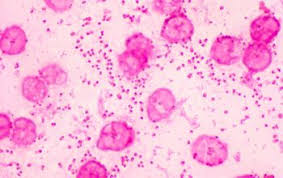 Small Gram negative, nonmotile facultative coccobacillus that is part of normal flora of cats, dogs and other animals and is a common cause of infection following bites or scratches by dogs and cats.
Small Gram negative, nonmotile facultative coccobacillus that is part of normal flora of cats, dogs and other animals and is a common cause of infection following bites or scratches by dogs and cats.
Associated with bipolar staining features.
Infections in humans often related to animal bites, scratches, or licks.
Infection may occur in the absence of animal contact.
Present in upper respiratory tracts of livestock and poultry.
Cause infections of mainly skin and soft tissue or contiguous sites, such as bone and joints but rarely can cause endocarditis.
Many isolates are encapsulated.
Organisms grow on sheep blood agar and chocolate agar.
Isolated from the upper respiratory tract of cats and dogs.
Rare cause of pneumonia.
Most patients with P multocida respiratory tract infections have underlying COPD.
Pneumonia associated with bacteremia is found in 5% of patients in whom blood cultures are obtained and the overall mortality is 29%.
Pasteurella have a polysaccharide capsule composed of hyaluronic acid which provides virulence in strains responsible for animal diseases and is likely to be important in human infections.
P. multocida is susceptible to a variety of antibiotics.
Penicillin is the antibiotic of choice, and expanded-spectrum cephalosporins, macrolides, tetracyclines, or fluoroquinolones are acceptable alternatives.
Semisynthetic penicillins, such as oxacillin, first-generation cephalosporins, and aminoglycosides have poor activity.
